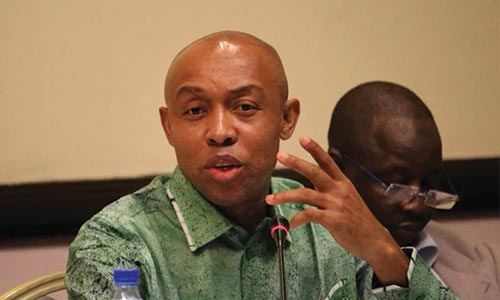Illegality of Nnamdi Kanu’s Rendition from Kenya

By Femi Falana, SAN
Background
In the case of Nnamdi Kanu v Federal Government of Nigeria, the Defendant was charged with treason and allied offences before the Federal High Court. During the pendency of the case, the Defendant jumped bail and fled to the United Kingdom. While on a trip to Kenya last year, the Defendant was abducted and brought to Abuja by Nigerian security operatives. Without considering the legal implication of the rendition, the Attorney-General of the Federation and Minister of Justice, Mr Abubakar Malami SAN announced that the trial of Mr. Kanu would soon commence. Thereafter, the charge was amended while the Defendant’s application for bail was dismissed.
Court Proceedings
However, the preliminary objection filed by the defence against the 15-count charge partly succeeded, as 8 counts were dismissed by the trial Judge, Binta Nyako J. Dissatisfied with the ruling of the Federal High Court, the Defendant approached the Court of Appeal for redress. In an epochal judgement delivered a fortnight ago, the three-Judge Panel of the Court of Appeal led by Justice Jummai Hanatu Sankey, said it was satisfied that the Federal Government flagrantly violated the law, when it forcefully rendered Kanu from Kenya to the country for the continuation of his trial. It held that such extraordinary rendition, without adherence to due process of the law, was a gross violation of all international conventions, protocols and guidelines that Nigeria is signatory to, as well as a breach of the Appellant’s fundamental human rights.
The court noted that Nigeria is a signatory to OAU Convention which it ratified on April 28, 2022, as well as the Charter of Human and Peoples Rights, which it said prescribed how a wanted person could be transferred from one country to the other. It held that any extradition request must be in writing, with a statement indicating offences for which a person is wanted. The appellate court held that the Federal Government’s action tainted the entire proceedings it initiated against Kanu, and amounted to “an abuse of criminal prosecution in general”. Having found that the Federal Government had engaged in serious abuse of power, their Lordships said that the courts “will never shy away from calling the Executive to order when it tilts towards Executive recklessness”.
Consequently, the Court of Appeal struck out the remaining 7 counts pending at the Federal High Court, discharged the Appellant, and ordered Mr Kanu’s immediate release from the custody of the State.
The Federal Government has filed an appeal against the decision of the Court of Appeal, and a motion for stay of execution pending the determination of the appeal. While the grounds of appeal have not attempted to justify the refusal of the Federal Government to comply with the provisions of the African Union Convention on Extradition and the African Charter on Human and Peoples Rights, the application for stay constitutes a gross abuse of court process. In the case of Nigerian Army v Mowarin (1992) 4 N.W.L.R. (Pt. 235) Page 345, the Court of Appeal dismissed the motion for stay of execution of the judgement of the Lagos High Court for the release of the Appellant. In justifying the ruling of the Court of Appeal, Kalgo J.C.A. (as he then was) held that “the refusal of the application will not cause any injury to the Applicant, but if the application is granted, the Respondent will continue to suffer personally in detention after the court has declared her detention unlawful ab initio”. Based on the dismissal of the application for stay of execution, the then military junta released the Respondent from further custody.
Effect of the Order of Discharge
No doubt, a Defendant may be discharged by a criminal court on the grounds that the charge against him or her has not been substantiated, or due to an incurable defect in the charge. The case is struck out, while the Defendant is discharged and ordered to be released. The State may rearrest and re-arraign the Defendant, if there is fresh evidence or the defect has been cured. But, in certain cases, the defect cannot be cured. For instance, Henry Okar was arraigned on a 62-count charge. We challenged the competence of 59 of the counts, due to the fact that the offences were allegedly committed in Bayelsa State while he was charged in Jos, Plateau State. As the State had no answer to the objection, the counts were withdrawn and struck out by the trial court.
We also challenged the jurisdiction of the Court to try the remaining 3 counts on treason and treasonable felony, as they were not filed within the mandatory period of 3 years permitted by law. At that juncture, the Yar’Adua administration opted for a political resolution of the case. The State filed a nolle prosequi application, which led to the termination of the case. Similar cases pending against other militants were discontinued, while the State adopted the Amnesty programme. That was how the Federal Government restored law and order, in the Niger Delta region.
Conclusion
In the instant case, the claim of the Federal Government that there are are some pending charges against Mr Kanu in the Federal High Court, is a contemptuous mockery of the Court of Appeal which has struck the remaining 7-count charge. Any new charge anchored on Kanu’s illegal abduction from Kenya, is bound to fail. To that extent, the order of discharge is akin to an acquittal. The Federal Government should take advantage of the intervention of the Court, to adopt a political solution in the resolution of the case. Since the Federal Government is currently engaged in negotiations with terrorist groups, it should not hesitate to enter into negotiations with Nnamdi Kanu and his group without any further delay.
Femi Falana, SAN



